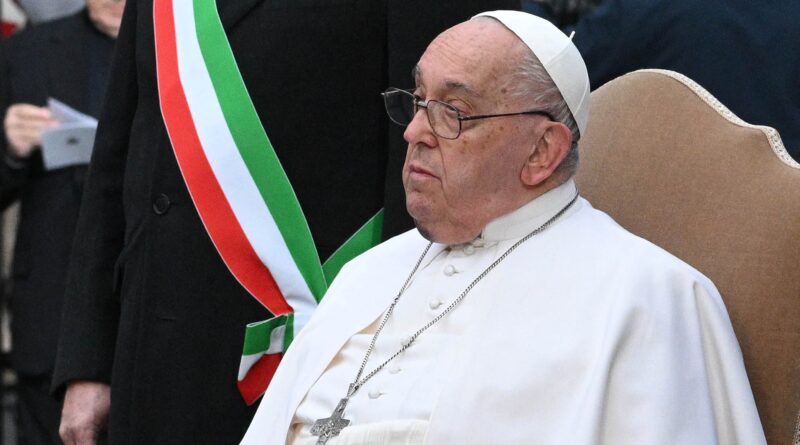With genocide comments, nativity visit, Pope sows doubts about commitment to Jews…
On Saturday, Pope Francis joined Palestinian officials to inaugurate a nativity scene in the Vatican.
The event should have been unremarkable, except for one detail — baby Jesus, a Jew, was lying on a keffiyeh, the scarf used as a national symbol for Palestinians.
Other popes might have been given the benefit of the doubt by Jewish groups involved in dialogue with the Catholic Church, citing poor planning by aides or a lapse in judgment. But for Francis, the scene — which plays into contemporary narratives seeking to erase the connection between Jews and Judea, the land where Jesus was born — is part of a concerning pattern when he speaks about Jews and Israel.
The previous month, comments by Francis emerged in which he called for an investigation into whether Israel was committing genocide in Gaza.
“According to some experts, what is happening in Gaza has the characteristics of a genocide,” the pope said in excerpts from a book, “Hope Never Disappoints: Pilgrims Toward a Better World,” based on interviews with the pontiff.
Get The Times of Israel’s Daily Edition
by email and never miss our top stories
By signing up, you agree to the terms
“We should investigate carefully to determine whether it fits into the technical definition formulated by jurists and international bodies,” he continued.

Pope Francis prays before the ‘Nativity of Bethlehem 2024,’ upon its inauguration in the Paul VI Hall, during the private audience with donors of the nativity scene and the lighting of the Christmas tree ceremony at St Peter’s Square, in the Paul-VI hall at the Vatican on December 7, 2024. (Andreas Solaro/ AFP)
The reaction from Israel and Jewish groups was furious.
The umbrella body International Jewish Committee on Interreligious Consultations called the claim Israel was committing genocide “categorically false.”
“To grant it any credibility is deeply problematic and objectionable,” it continued in a statement. “Doing so serves only to frustrate any resolution of the conflict and fuels an already out of control global antisemitism.”
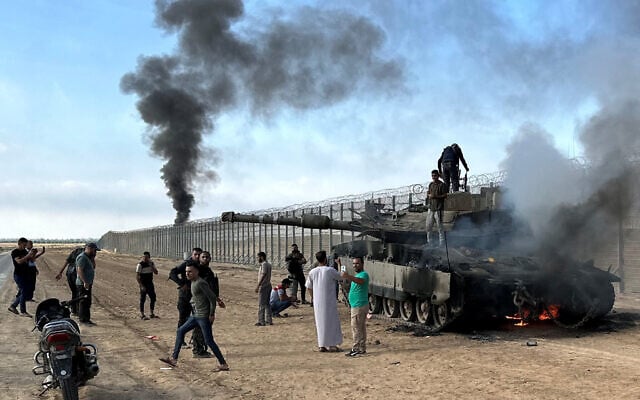
Palestinians on the Israeli side of the Gaza border fence during a Hamas-led invasion and slaughter in southern Israel, October 7, 2023. (Reuters/Mohammed Fayq Abu Mostafa)
“There was a genocidal massacre on 7 October 2023 of Israeli citizens, and since then, Israel has exercised its right of self-defense against attempts from seven different fronts to kill its citizens,” Israeli Ambassador to the Holy See Yaron Sideman said. “Any attempt to call it by any other name is singling out the Jewish state.”
The Pope’s suggestion that Israel might be guilty of genocide came after more than a year of frustration from Jewish leaders involved in dialogue with the Catholic Church.
That exasperation was further compounded by the pontiff’s uneven handling of his relationship with the global Jewish community.
A golden age
Despite the tumult over Francis’s recent statements and actions, Jewish-Catholic relations are undoubtedly in a golden age in recent decades. The revolution in ties began with a rather brief document issued on October 28, 1965 by more than 1700 Catholic bishops gathered in Rome for the Second Vatican Council — Nostra Aetate.
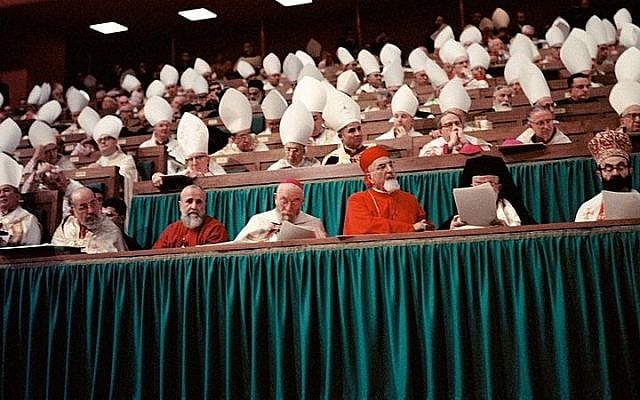
Catholic Bishops at the Second Vatican Council in Rome, 1965. (CC BY-SA, Wikimedia commons)
The document launched a steady, ongoing process that did away with centuries-old stereotypes in the Church in which Jews were depicted as Christ-killers and rootless wanderers.
More than a half-century later, Francis is now the third pope in a row who has described antisemitism as a sin incompatible with Christian belief and visited Israel. Papal visits to synagogues are almost routine.
The church is committed to fighting antisemitism, and popes insist that God’s covenant with the Jewish people was never broken.
“This would have been absolutely unthinkable 50 years ago, let alone 500 years ago,” said Rabbi David Rosen, former American Jewish Committee International Director of Interreligious Affairs.
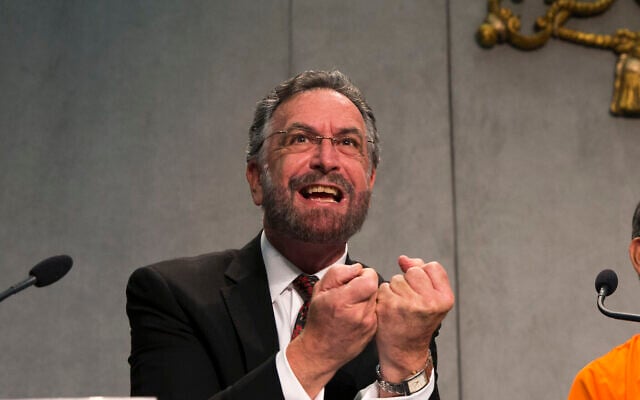
Rabbi David Rosen, talks during a press conference following the general audience in the Vatican press center, October 28, 2015. (AP/Alessandra Tarantino)
At the same time, areas of discord remain.
The Vatican recognized Israel in 1993 and popes have said that they understand how central the country is to contemporary Jewish identity. But the Church has not been willing to grant Israel any theological significance.
“There’s a paradox there,” Rosen explained. ” If you say that the covenant between God and the Jewish people is eternal, the covenant has never been broken, that covenant focuses specifically upon this particular land. And therefore to say that the return of the Jewish people to its ancestral home doesn’t have theological meaning is highly problematic.”
Francis and the Jews
Francis himself, even while he was still Cardinal Jorge Mario Bergoglio, continued along the Catholic Church’s path when it came to Jews. He established a close friendship with local Buenos Aires Jewish leaders and with Rabbi Abraham Skorka, with whom he wrote a book and remains in contact.
As pope, he visited Auschwitz, and while in Israel made the first pilgrimage by a pope to the tomb of Zionist visionary Theodor Herzl. He regularly denounces antisemitism, calling it “neither human nor Christian.”
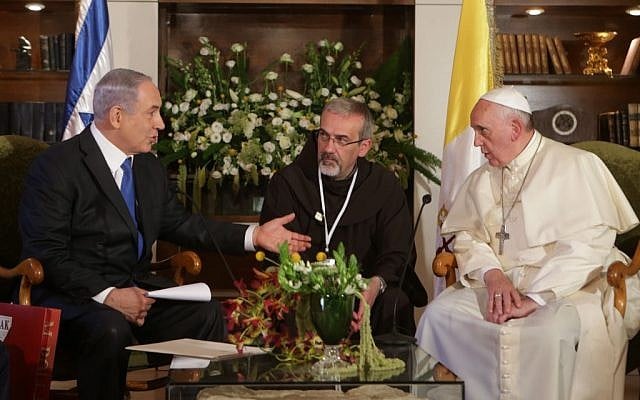
Pope Francis with Israeli Prime Minister Benjamin Netanyahu during a meeting in Jerusalem on May 26, 2014. (Alex Kolomoisky/POOL/Flash90)
However, he has been at times less careful — or perhaps less attentive — than his two predecessors when it comes to Jews and their sensitivities.
During his 2014 visit to Israel, Francis made an unscheduled stop at the concrete security barrier between Bethlehem and Jerusalem. According to his driver, they were driving by a section of the wall covered by graffiti comparing Bethlehem and the Warsaw Ghetto when the Pope asked to be let out. The image of him praying at that spot excited Palestinians and angered Israelis.
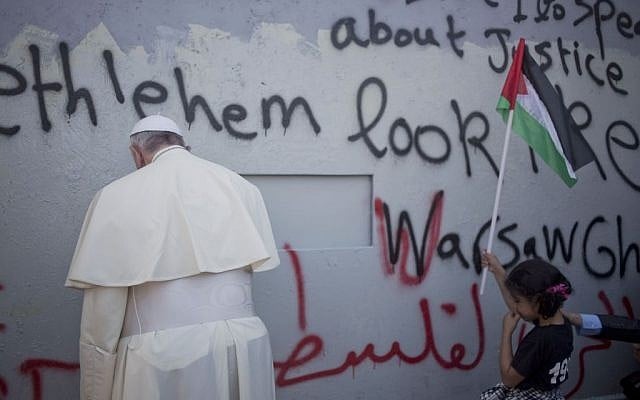
Pope Francis stands at Israel’s West Bank security barrier on his way to a mass in Manger Square in Bethlehem on Sunday, May 25, 2014. (AP Photo/Ariel Schalit)
In 2019, the pontiff was urged by experts to take greater care when referring to “hypocritical” Pharisees, a stereotype that fueled centuries of bad blood between Catholics and Jews.
Two years later, Francis told an audience that the law of the Jewish Torah “does not give life, it does not offer the fulfillment of the promise because it is not capable of being able to fulfill it. The Law is a journey, a journey that leads toward an encounter… Those who seek life need to look to the promise and to its fulfillment in Christ.”
The Chief Rabbinate sent a letter in protest, saying, “This is in effect part and parcel of the ‘teaching of contempt’ towards Jews and Judaism that we had thought had been fully repudiated by the Church.”
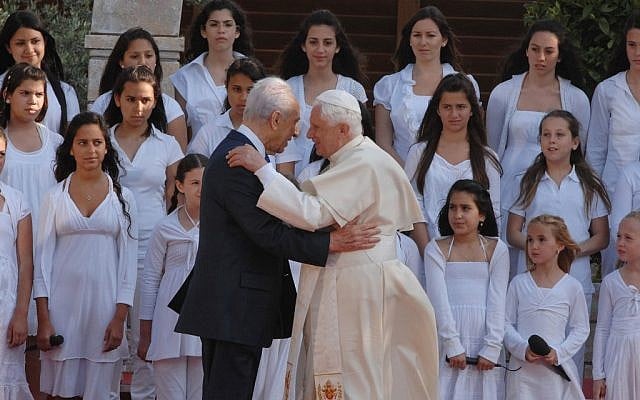
Shimon Peres and Pope Benedict XVI meeting in Jerusalem in 2009. (Avi Ohayon/GPO/Flash90)
The Vatican responded that the pope had not intended to be seen as passing judgment on the law of the Torah.
“He makes mistakes in his comments on Jews,” Rosen maintained, pointing to the pontiff’s tendency to quote New Testament passages that portray Pharisees and rabbis in a negative light. “[Pope] Benedict would never have done that.”
Rosen sees a worrying pattern that he doesn’t expect to change. “We’ve tried to bring it to his attention many times in many different ways. He’s been warned so many times on these things and he continues to do it.”
“I don’t think he understands our sensibilities profoundly,” Rosen postulated.
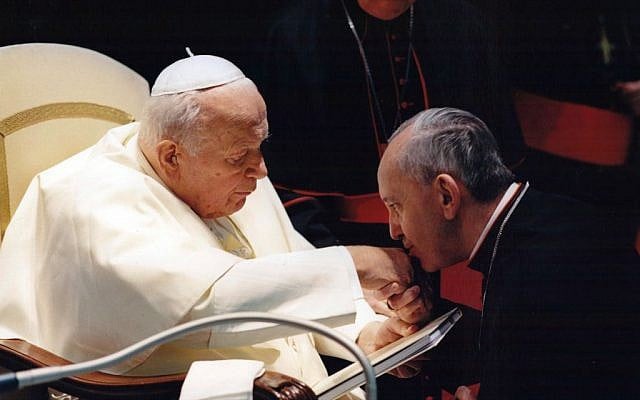
Jorge Mario Bergoglio, Archbishop of Buenos Aires, right, kisses the hand of Pope John Paul II during a ceremony at the Vatican. Bergoglio, who since then became Pope Francis, cleared Pope John Paul II for sainthood (AP/Sergio Rubin)
That disconnect could come from the fact that, unlike his predecessors, Francis did not witness the Holocaust firsthand, and it did not shape his worldview as a young man.
His background likely formed his outlook in other ways. “As a Latin American priest and bishop, and a Jesuit, he is heavily influenced by liberation theology,” Murray Watson, an expert on Catholic-Jewish relations, told The Times of Israel, “which gives great weight to standing in solidarity with the poor and suffering.”
As superior of Argentina’s Jesuits, Bergoglio experienced the country’s brutal military dictatorship, potentially coloring how he saw militaries in general.
Throughout the war in Gaza, said Saint Joseph’s University professor Philip Cunningham, Francis has been struck by its human toll.
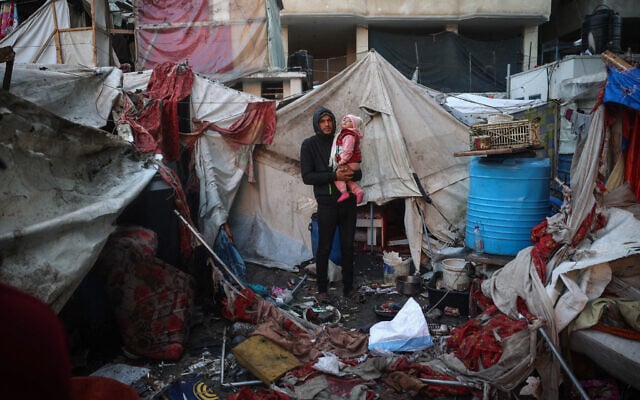
Displaced Palestinians inspect the damage at a makeshift camp apparently after what Israel has said was strikes on terror infrastructure, near the Abu Hmayseh school at the Bureij refugee camp in the central Gaza Strip on December 4, 2024 (Eyad BABA / AFP)
“That’s what grips him,” said Cunningham. “And his comments are generally driven by, ‘Let’s stop human beings from killing each other and dying in large numbers.’”
There is also a broader trend within the Catholic Church that the Pope might be reflecting, Cunningham posited. The West’s approach to the rules of war is firmly rooted in Catholic Just War Theory, which affirms the possibility of nations pursuing and winning conflicts in an ethical fashion.
The understanding that war can be justified and necessary is changing in the Catholic community.
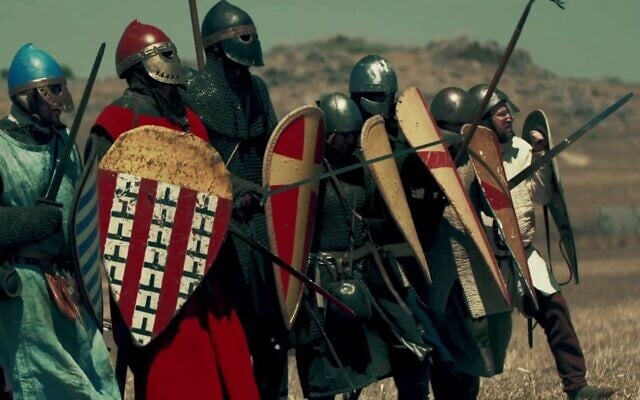
A reenactment of the “Horns of Hattin” battle from the Jerusalem Kingdom club illustrates what a Crusader battle would have looked like around the 12th century. (courtesy IAA)
“There is a great suspicion about whether the conditions for a just war could ever actually exist,” said Cunningham, “particularly in an era when you’ve got weapons of mass destruction that can wipe out whole populations. There’s been a tendency in the Catholic community to be very suspicious of justifying war at all.”
Other scholars are far more critical in their reaction to the Pope’s comments.
“I am convinced that Francis does not understand the implications of what he says,” posited Rabbi Eugene Korn, former academic director of the Center for Jewish-Christian Understanding and Cooperation in Israel. “He is, after all, a pastor and not a theologian, and surely his advanced age of 88 years influences his statements.”
The Latin Patriarchate of Jerusalem declined to comment for the article.
Stepping backward
In the aftermath of the Hamas attacks on October 7, 2023, Francis has tried to uphold a number of key principles, said Watson.
He has called for the war to be limited to the extent possible; has stressed the dignity of all involved in the conflict, especially those most vulnerable; has offered to work behind the scenes as an intermediary; has pointed at an emerging “Third World War, being fought piecemeal”; and has tried to do what he can to protect Palestinian Christians.
The Pope has met with hostages’ families and freed hostages on multiple occasions, praying with them and telling them he would do whatever he could to secure the release of those held in Gaza.
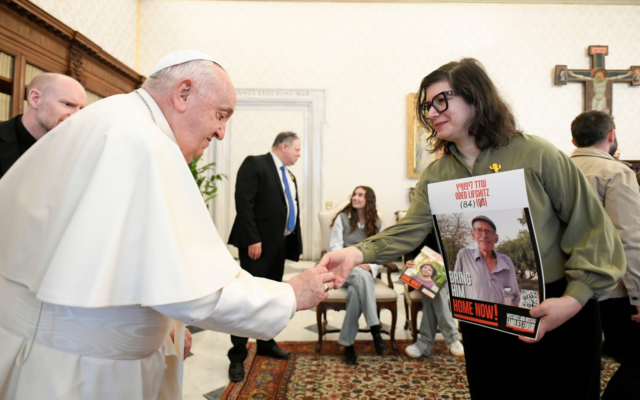
Pope Francis shakes hands with Sharone Lifshitz, the daughter of Israeli hostage Oded Lifshitz, during a meeting in the Vatican on November 14, 2024. (Vatican media)
But the Pope’s statements and tweets have left Jews feeling confused at times, and under attack at others. In a November 2023 call with Israel’s President Isaac Herzog, Francis reportedly said it is “forbidden to respond to terror with terror.”
The pope, said South Africa’s Chief Rabbi Waren Goldstein in response, “repeats the sins of Pope Pius XII from the Nazi era, of surreptitiously supporting the forces of evil who seek to annihilate the Jewish people.”
Rome’s Chief Rabbi Dr. Riccardo di Segni voiced his “great disappointment” in the pope, warning that Jewish-Catholic relations had taken “many steps backward.”
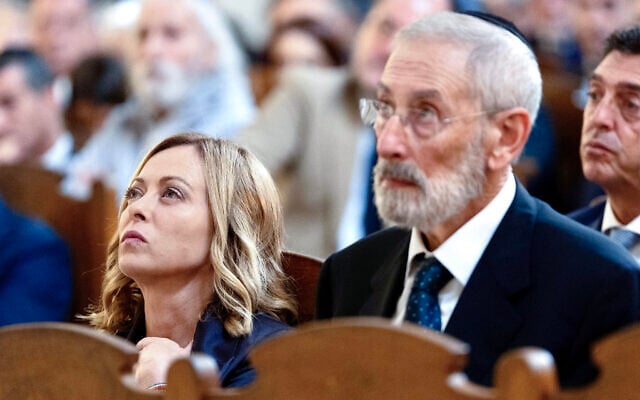
Italian Prime Minister Giorgia Meloni (L) flanked by Rome’s Rabbi Riccardo Shemuel Di Segni commemorating the first anniversary of the victims of the October 7, 2023 Hamas terror attack on Israel, at the Synagogue in Rome, October 7, 2024. (Palazzo Chigi press office / AFP)
Shortly after the October 7 attacks, hundreds of Jewish leaders and scholars wrote an open letter to Francis, asking the Chuch to unequivocally condemn Hamas’s attacks and to distinguish terorrism from Israel’s war on the group.
It took three months for the Pope to respond in a letter that condemned antisemitism, reaffirmed the bond between the Church and Jews, and stressed that his “heart is torn at the sight of what is happening in the Holy Land, by the power of so much division and so much hatred” — but failed to mention Hamas.
German Catholic theologian Gregor Maria Hoff blasted the Pope’s response: “It is not enough to condemn violence without unambiguously identifying the responsible actors. It does not help to invoke the ‘path of friendship, solidarity and cooperation’ while the Jewish partner has to fight for his survival in his own country and on its borders.”
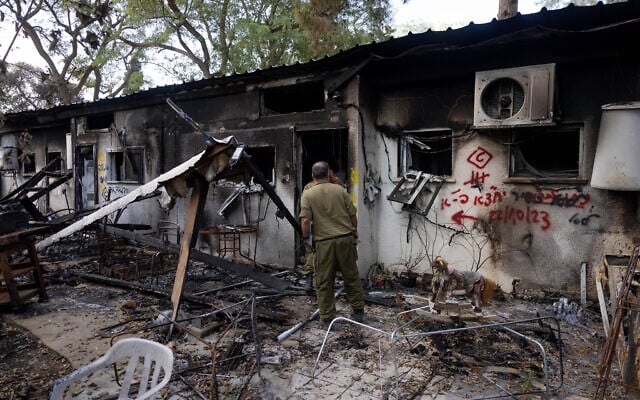
Illustrative: Israeli soldiers walking next to the destruction caused by Hamas terrorists in Kibbutz Nir Oz on October 7, 2023, near the Israeli-Gaza border, in southern Israel, November 21, 2023. (Chaim Goldberg/Flash90)
Another letter from the pontiff, this one addressed to Middle East Catholics on the one-year anniversary of October 7, confounded those who care about Catholic-Jewish relations.
Francis decried “the fuse of hatred” lit the year before (though notably did not lay out who struck the match) and lamented “the spirit of evil that foments war.”
Then, quoting one of New Testament verses most often used to justify Christian antisemitism, he wrote that this spirit was “murderous from the beginning,” and “a liar and the father of lies.”
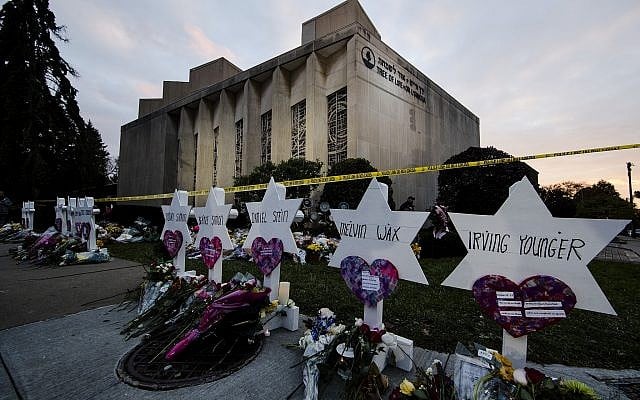
A makeshift memorial stands outside the Tree of Life synagogue in the aftermath of a deadly shooting in Pittsburgh, on October 29, 2018 in which eleven Jews were killed while at Shabbat services. (AP/Matt Rourke)
The verse, John 8:44, was used in children’s books in Nazi Germany, and was cited by the perpetrator of the deadly attack on Pittsburgh’s Tree of Life synagogue on his social media profile.
“It is impossible to overstate what a disaster this is for Jewish-Catholic relations,” wrote Villanova University professor Ethan Schwartz.
“We must express not only our deep concern but our absolute dismay at both what was said and what was conspicuously omitted from your message,” wrote the Chief Rabbinate Council for Relations with the Catholic Church in a letter to the pope.
Into an ice age
Israel’s Chief Rabbinate still has not decided on a response to Francis’s comments, according to Oded Weiner, past Director General of the Chief Rabbinate, and a leader in its ties with the Holy See.
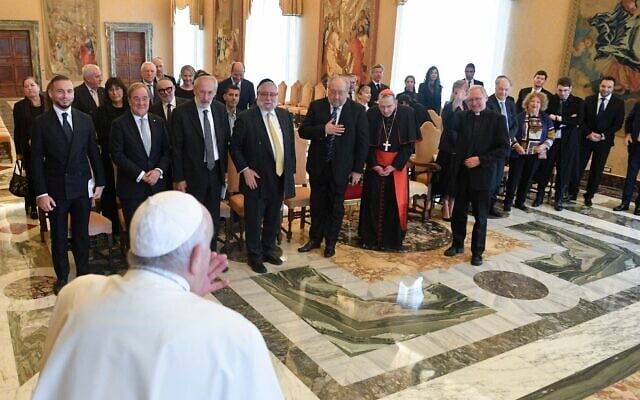
This photo taken and released by the Vatican Media on November 6, 2023, shows Pope Francis during a meeting with a delegation of the Conference of European Rabbis in The Vatican. (Handout/Vatican Media/AFP)
“We are weighing how to react,” he said, adding that some members of its Catholic relations council wanted to suspend relations with the Vatican.
Weiner said the council received news of the genocide remarks “with total bewilderment.”
“Is this appropriate to say now, while antisemitism runs rampant in Europe?” he asked. “Throughout the years there have been accusations pointed at us about blood libels and that Jews are murderers. Now, after Amsterdam and after France and after all the hatred and antisemitism that is burning in every part of Europe, at exactly this time you found something to say?”
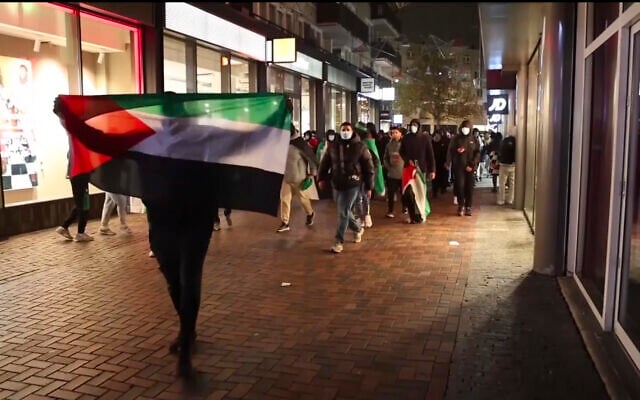
In this image taken from video, people march with Palestinian flags near the Ajax stadium in Amsterdam, November 7, 2024. (AP Photo InterVision)
Cunningham urged cooler heads to prevail, and for the decades of Jewish-Catholic conversations to continue. “The immediate urgency that I feel, and I don’t think I’m alone in this among Catholics, is that the dialogue must not be allowed to become one of the victims of the conflict; that we must continue,” he said.
According to Rosen, that dialogue won’t end, but “it’s definitely going to be going through a bit of an ice age.”
“This is the Pope who was seen as the great friend of the Jewish people and who sees himself as a great friend of Jewish people,” Rosen lamented. “He will not be seen in Jewish quarters in quite the same positive light as he was seen before.”

